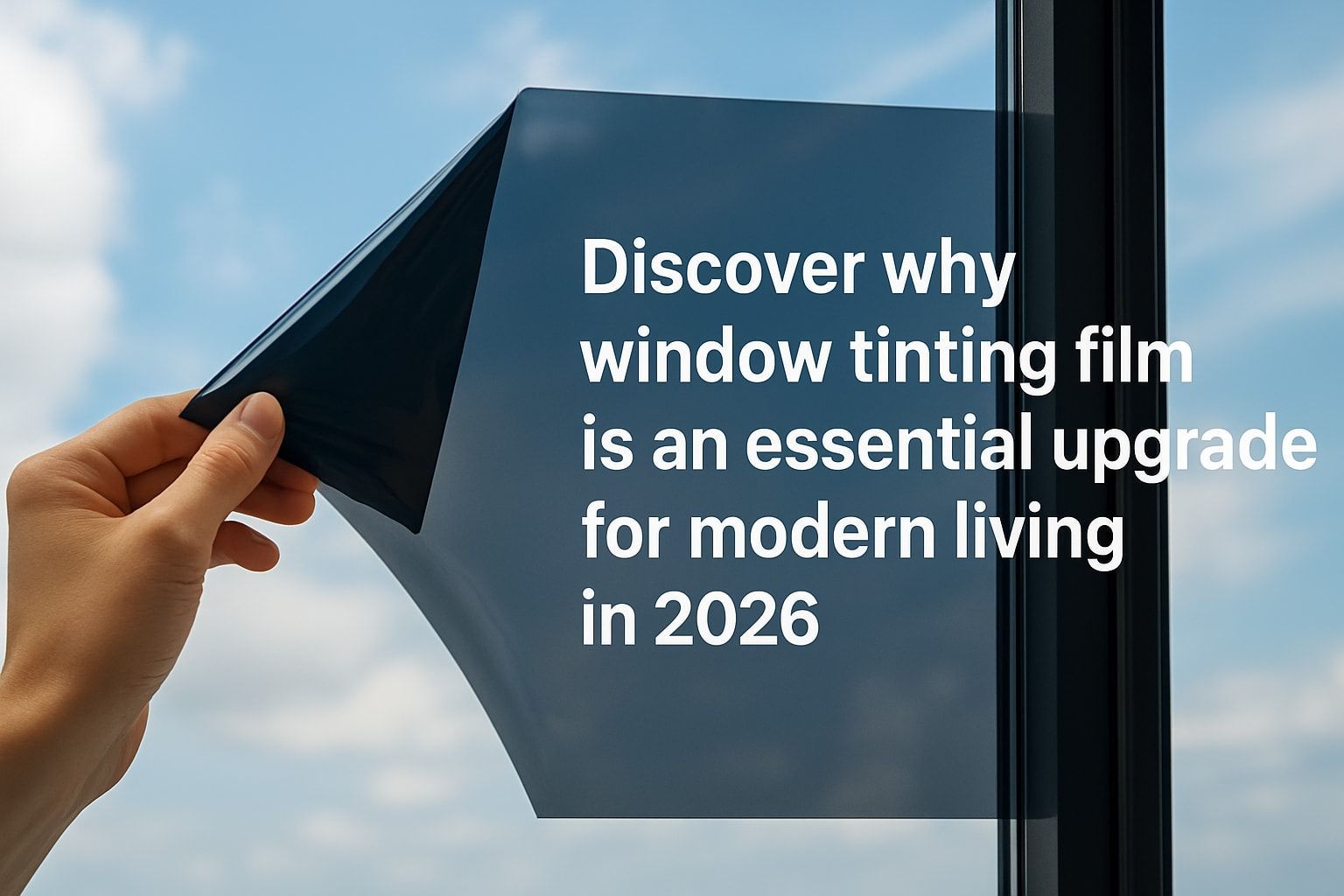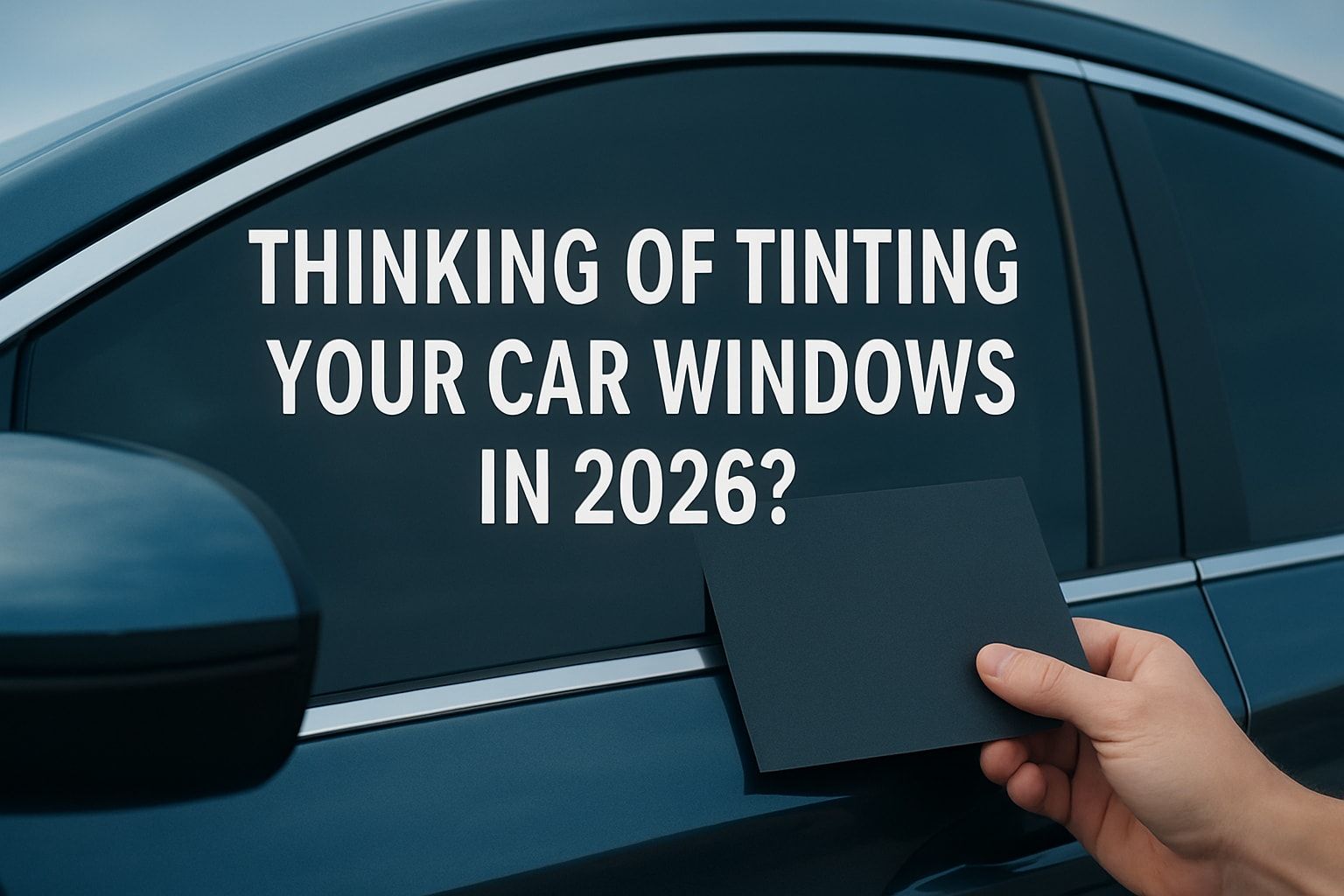The Essential Guide to Residential Window Tinting Services
This is a subtitle for your new post
Imagine transforming your home into a sanctuary of comfort and efficiency with just one upgrade. Residential window tinting services are quickly becoming the choice for homeowners seeking greater energy savings, enhanced privacy, and protection from harmful UV rays.
This essential guide for 2025 demystifies residential window tinting services, giving you the knowledge to make confident decisions about your property. With homeowner interest rising, now is the perfect time to explore the latest advancements in window tinting.
Inside, you will discover the key benefits, learn about the different types of window tints, understand the installation process, explore cost considerations, and find out how to choose a reputable service provider. Unlock the full potential of your home with practical advice tailored for the modern homeowner.
Why Consider Residential Window Tinting in 2025?
Residential window tinting services are fast becoming a must-have upgrade for homeowners in 2025. With advancements in materials and growing awareness of climate and health issues, the reasons for considering this investment are more compelling than ever. Whether you are seeking energy savings, improved comfort, or enhanced home value, understanding the benefits of residential window tinting services can help you make a smart decision for your property.
Enhanced Energy Efficiency and Cost Savings
One of the top reasons to choose residential window tinting services in 2025 is energy efficiency. Modern window films can reduce energy bills by up to 30 percent by minimizing unwanted heat gain in the summer and heat loss in the winter. These films provide insulation that makes your home more eco-friendly and comfortable year-round.
For example:
- Homes with tinted windows use less HVAC energy.
- Energy Star reports show reduced energy consumption.
To explore how sun control films can benefit your home, visit the Sun control window film benefits page for detailed insights.
Improved Comfort and UV Protection
Residential window tinting services are designed to block up to 99 percent of harmful UV rays, protecting both your skin and your home’s interior. This protection extends the lifespan of furniture, flooring, and artwork by reducing fading.
Reduced glare also improves comfort for work and relaxation, making your living spaces more enjoyable. Studies have shown that UV exposure through windows is a leading cause of fading and deterioration in household materials.
Privacy and Security Benefits
With residential window tinting services, you gain privacy without losing natural light. Tinted films make it more difficult for outsiders to see into your home, which is especially useful for street-facing windows and bathrooms.
Increased security is another advantage. Security films reinforce glass, making it harder to break and deterring potential intruders. Some insurance companies even offer discounts for homes with security window films, recognizing the added protection.
Modern Aesthetics and Home Value
Today’s residential window tinting services offer a wide range of shades and finishes to complement any architectural style. This customization enhances your home’s curb appeal and can potentially increase its resale value.
Real estate agents often note that homes with upgraded window treatments, like window tinting, are more appealing to buyers. Whether you prefer a subtle look or a bold decorative film, there is an option to match your vision.
Environmental Impact
Choosing residential window tinting services is an environmentally responsible decision. By lowering your home’s energy consumption, you reduce your carbon footprint. Many modern films are also recyclable and manufactured using sustainable practices.
The EPA highlights window upgrades as a key improvement for home sustainability, and tinted windows are a practical way to contribute to greener living.
Health and Wellness Considerations
Residential window tinting services can help maintain consistent indoor temperatures, which supports better sleep and overall well-being. By blocking UV rays linked to skin cancer and eye damage, these films add an extra layer of health protection for your family.
For individuals sensitive to temperature fluctuations or sunlight, window tinting creates a more comfortable and safer home environment.
Regulatory and Insurance Trends for 2025
Building codes in 2025 are evolving to recommend or require energy-efficient window treatments, including residential window tinting services. Insurance companies are also increasingly offering incentives for installing security and UV-protective films.
Staying up to date with these trends ensures your home remains compliant and can even reduce your insurance premiums, making window tinting a smart financial move.
Types of Residential Window Tinting Films
Choosing the right window film is essential for maximizing the value of residential window tinting services. With advancements in technology and design, homeowners can select from a variety of films tailored to specific needs. Each type of film offers unique benefits for comfort, protection, and aesthetics.
Solar Control Films
Solar control films are a popular choice for homeowners seeking to enhance energy efficiency. These films help regulate indoor temperatures by reducing heat gain in summer and heat loss in winter. By blocking a significant portion of infrared and ultraviolet rays, they contribute to lower energy bills and a more comfortable living environment.
Homeowners appreciate that solar control films come in various shades and visible light transmissions. This allows customization based on how much natural light you want to let in. Ceramic films, in particular, are known for offering excellent heat rejection without noticeably darkening windows.
With residential window tinting services, solar control films provide a practical solution for eco-conscious families. They minimize glare, protect furnishings, and support sustainable living.
Security and Safety Films
Security and safety films add an extra layer of protection to your home’s glass surfaces. These films are much thicker than standard options, providing reinforcement against impacts from accidents, storms, or attempted break-ins. In areas prone to severe weather or security concerns, these films are invaluable.
When you choose residential window tinting services that include safety films, you increase both physical security and peace of mind. These films hold shattered glass in place, reducing the risk of injury and property damage.
For a deeper understanding of their benefits, explore Safety and security window films to see how they deter break-ins and comply with insurance requirements.
Decorative and Privacy Films
Decorative and privacy films offer both style and function. These films can mimic frosted, etched, or patterned glass, making them ideal for bathrooms, entryways, or any area where privacy is desired without sacrificing light.
Residential window tinting services often include a wide array of decorative options. Frosted films are especially popular for street-facing windows, enhancing privacy while allowing soft, diffused sunlight to fill the room.
Besides privacy, these films provide a creative way to update your home’s look. You can coordinate patterns and colors to match your interior design, making your windows a focal point.
UV-Blocking Films
UV-blocking films are engineered to filter out up to 99 percent of harmful ultraviolet rays. This feature is critical in preserving the life and appearance of your home’s interior. Prolonged UV exposure can cause fabrics, flooring, and artwork to fade over time.
By incorporating UV-blocking films as part of residential window tinting services, homeowners ensure better protection for their investment. These films do not noticeably alter the appearance of windows but deliver significant long-term benefits.
UV protection also supports health by reducing risks associated with sun exposure indoors.
Low-E (Low Emissivity) Films
Low-E films are designed with advanced coatings that reflect infrared energy and block UV rays. This technology is particularly effective in climates with extreme temperature variations, offering year-round comfort.
Residential window tinting services featuring Low-E films help maintain consistent indoor temperatures. In winter, they reflect heat back into the room; in summer, they keep excess heat outside.
These films are a smart investment for energy-conscious homeowners, as they contribute to reduced heating and cooling costs.
Smart and Switchable Films
Smart and switchable films represent the cutting edge of window technology. These films can change from clear to opaque at the touch of a button, offering instant privacy or openness as needed.
When selecting residential window tinting services, smart films are ideal for high-tech homes and multifunctional spaces. They are commonly used in home offices, bathrooms, and bedrooms where privacy needs can change throughout the day.
The convenience of electronic control adds value and versatility to modern living environments.
Specialty Films for Unique Needs
Some homes require specialized window films for unique challenges. Anti-graffiti films protect glass in urban environments, while anti-glare films improve comfort for home theaters or offices. Anti-fog films are perfect for bathrooms and kitchens where condensation is an issue.
Residential window tinting services can be tailored with these specialty films to address specific concerns. For example, anti-graffiti films make cleaning vandalism easier and prevent permanent damage.
No matter your home’s needs, there is a window film solution to enhance comfort, security, and style.
The Residential Window Tinting Process: Step-by-Step
Transforming your home with residential window tinting services involves a clear, professional process. Each step ensures optimal results, from the first consultation to ongoing support. Here is a comprehensive look at what you can expect when working with experts in residential window tinting services.
Step 1: Initial Consultation and Needs Assessment
Every residential window tinting services project begins with an in-depth consultation. Professionals visit your home to assess window layouts, sun exposure, and your specific needs. They discuss your goals, such as reducing heat, increasing privacy, or improving aesthetics.
You will receive expert guidance on suitable film types and performance expectations. This step ensures the recommended solutions align with your unique requirements. Open communication with your provider helps set clear expectations for the entire process.
Step 2: Product Selection and Customization
Once your needs are identified, the next phase of residential window tinting services focuses on choosing the right product. You will explore a range of films, considering energy efficiency, privacy, and style preferences.
Custom options are available to match your home's design or comply with HOA guidelines. Each window is measured for precise sizing, and tint colors are selected to complement your décor. This tailored approach ensures a seamless addition to your property.
Step 3: Surface Preparation
Proper preparation is vital for the success of residential window tinting services. Installers begin by cleaning all glass surfaces thoroughly with non-abrasive solutions. Removing dust, debris, and any old film ensures optimal film adhesion.
If previous tint exists, it is carefully stripped away. Clean, debris-free glass provides a flawless foundation for the new film. Attention to detail during preparation helps maximize film longevity and appearance.
Step 4: Film Application and Installation
The heart of residential window tinting services lies in the application and installation. Technicians use precision-cutting tools to match each window's dimensions. Films are expertly aligned and applied, with special care taken to eliminate bubbles and creases.
Professional tools ensure a smooth, consistent finish across all windows. For a closer look at real-world results, explore the Residential window tinting project gallery showcasing completed installations. This step demonstrates the skill and expertise required for a flawless outcome.
Step 5: Quality Inspection and Finishing Touches
After installation, every detail is inspected to guarantee the highest quality. Installers check for defects, proper adhesion, and visual consistency across all windows. Edges are sealed to boost durability and weather resistance.
Any imperfections are addressed immediately, ensuring your residential window tinting services meet industry standards. The process concludes with a walkthrough, so you can review the finished work and ask questions.
Step 6: Curing and Aftercare Instructions
Following installation, the film requires a curing period, typically lasting two to four weeks. During this time, you may notice a hazy appearance that disappears as the adhesive sets. Installers provide clear aftercare instructions to maintain your investment.
Care tips include using soft cloths and gentle cleaners to avoid damaging the film. Proper aftercare extends the lifespan and performance of your residential window tinting services.
Step 7: Warranty and Support
A reputable provider of residential window tinting services stands behind their work with robust warranties. These typically cover issues such as peeling, bubbling, or fading, offering peace of mind for years to come.
Ongoing customer support is available to answer questions or address concerns after the job is complete. This commitment to service ensures you get the most from your new window tinting investment.
Factors Affecting the Cost of Residential Window Tinting
Choosing residential window tinting services is a smart investment, but understanding what shapes the cost is essential for homeowners planning their projects. Several factors influence the final price, from the size of your windows to the complexity of installation. By breaking down each element, you can make informed choices that best fit your needs and budget.
Window Size and Number
The total area of glass in your home is a primary driver for the cost of residential window tinting services. Larger windows or homes with many glass surfaces require more film and labor, increasing the overall project price. For example, tinting a standard three-bedroom home is typically less expensive than treating a multi-story property with expansive windows.
Type and Quality of Film
The choice of window film significantly impacts the cost of residential window tinting services. Premium options such as ceramic or security films cost more upfront but deliver superior performance in terms of energy efficiency, UV protection, and durability. Basic dyed films are more budget-friendly but may offer fewer long-term benefits. Comparing film types helps you balance cost with desired outcomes.
Installation Complexity
Not all windows are created equal. Unique shapes, high placements, or challenging access points can complicate installation, leading to higher labor charges. Skylights, specialty glass, or custom designs require additional expertise and time, which are reflected in the final bill. Professional installers assess these variables during the initial consultation.
Geographic Location and Climate
Where you live also plays a role in the cost of residential window tinting services. Regional labor rates and climate considerations affect pricing and film selection. Homes in sunny climates may require higher-grade solar films for optimal performance. For more insight on how climate and location can influence both benefits and costs, see the Top 10 Benefits of Residential Window Tinting.
Professional vs. DIY Installation
Homeowners often weigh the pros and cons of hiring professionals versus attempting DIY installation. While DIY kits for residential window tinting services are available at lower prices, they may lack durability and void warranties. Professional installation ensures proper fit, longevity, and often includes a warranty, which can offset higher initial costs through better performance and peace of mind.
Additional Features and Services
Custom features such as decorative films, branded patterns, or extra security enhancements add to the total expense of residential window tinting services. Removing old film, addressing damaged glass, or requesting unique finishes may also increase costs. Discussing these preferences upfront with your provider helps avoid surprises later.
Typical Price Ranges and Estimates
To give you a clearer picture, national averages for residential window tinting services in 2025 range from $5 to $12 per square foot, depending on film type and region. Always request detailed, itemized estimates to understand where your investment is going. Comparing quotes from multiple providers ensures you receive fair pricing and high-quality results.
How to Choose a Residential Window Tinting Service Provider
Selecting the right provider for residential window tinting services is crucial for long-term satisfaction and value. Homeowners should focus on experience, product quality, transparent pricing, and customer service. A thoughtful approach ensures a smooth installation process and optimal results for your home.
Credentials and Experience
The foundation of any successful residential window tinting services project is the expertise of your installer. Look for companies with certifications from industry associations, such as the International Window Film Association (IWFA). Experienced professionals bring technical know-how and problem-solving skills that ensure a flawless result.
Ask about the number of years in business and the types of projects completed. Providers with a solid portfolio in residential window tinting services are more likely to anticipate challenges and deliver high-quality workmanship. Always verify licensing and insurance to protect your investment.
Product Selection and Customization Options
Not all residential window tinting services offer the same range of films. Choose a provider with a diverse selection, including solar control, security, decorative, and specialty films. Customization matters, especially if you need to match existing window treatments or have unique architectural features.
Discuss your goals for energy efficiency, privacy, and aesthetics. Reliable providers will recommend specific products tailored to your needs. Ask whether they can source premium brands and provide sample films for comparison. This attention to detail sets the best residential window tinting services apart.
Installation Process and Quality Assurance
A reputable provider should explain every step of the installation process for residential window tinting services. Expect a detailed timeline, from initial consultation to final inspection. Quality assurance protocols, such as edge sealing and bubble-free application, indicate professionalism.
Ask about the tools and techniques used, as well as the training of installation staff. Reliable companies back their work with warranties covering material and labor. Clarify who will handle aftercare and warranty claims to avoid surprises with your residential window tinting services.
Customer Reviews and Case Studies
Reputation is a powerful indicator of trustworthiness. Before hiring any residential window tinting services, research verified feedback and examine real project outcomes. Look for detailed testimonials, before-and-after photos, or video walkthroughs.
For authentic customer insights, visit Customer reviews for window tinting to see homeowners share their experiences and satisfaction levels. Case studies can reveal how providers solve problems and deliver value, helping you make a confident choice in residential window tinting services.
Transparency in Pricing and Estimates
Transparent pricing is essential when comparing residential window tinting services. Request itemized quotes that outline material costs, labor, and any additional fees. Avoid companies that provide vague estimates or pressure you into quick decisions.
Many reputable providers offer free, no-obligation consultations. Use these meetings to clarify your project scope and expectations. Clear communication about pricing demonstrates integrity and helps you budget effectively for residential window tinting services.
Local Knowledge and Regulatory Compliance
The best residential window tinting services understand local building codes, climate factors, and homeowners association (HOA) guidelines. Compliance ensures your installation meets safety and energy efficiency requirements while avoiding costly fines or rework.
Ask providers about their experience with regional regulations and incentive programs. Local expertise can help you maximize rebates or insurance discounts, making residential window tinting services a smarter investment for your property.
Lewolf Window Tint and Film Solutions: A Trusted Residential Partner
Lewolf Window Tint and Film Solutions, based in Magnolia, TX, sets a high standard for residential window tinting services. Their team specializes in UV protection, glare reduction, and decorative films, offering industry-leading warranties and complimentary estimates.
With a commitment to customer satisfaction, Lewolf combines personalized service with broad expertise. They serve both local and nationwide clients, ensuring every homeowner receives transparent communication and professional results.
Lewolf is recognized for its attention to detail and dedication to safety, security, and energy efficiency in every residential window tinting services project.
Maintenance, Longevity, and Upgrading Window Tinting in 2025
Keeping your window films in top condition ensures you get the most from residential window tinting services. Proper care extends the lifespan and performance of your investment, helping maintain energy savings, privacy, and protection for years.
Proper Cleaning and Care
Routine maintenance is essential for preserving the benefits of residential window tinting services. Always use non-abrasive cleaners and soft microfiber cloths to prevent scratching or clouding the film. Avoid ammonia-based solutions since they can break down film adhesives over time.
Gentle, circular motions help maintain clarity and prevent streaks. It is advisable to clean the windows every few months or as needed. This simple routine not only extends the film's life but also keeps your home looking its best.
Expected Lifespan of Modern Films
Modern window films offered by residential window tinting services are engineered for durability. With proper care, high-quality films can last between 10 and 20 years. Many manufacturers provide warranties that cover common issues such as fading, peeling, and bubbling during this period.
The actual lifespan depends on factors like sunlight exposure, film type, and maintenance habits. Investing in reputable brands and professional installation further ensures optimal longevity for your window tinting.
Signs of Wear and When to Replace
Over time, you may notice signs that your window film needs attention. Typical indicators include discoloration, bubbling, peeling edges, or a noticeable reduction in effectiveness. If you observe increased heat or UV entering your home, it may signal degraded performance.
Promptly replacing worn films is crucial for maintaining the energy efficiency and protection residential window tinting services are known for. Regular inspections help identify issues before they impact comfort or safety.
Upgrading to New Technologies
Technological advancements in window films make upgrading a smart decision for many homeowners. Recent innovations include smart and switchable films, self-healing coatings, and improved energy performance. Upgrading through residential window tinting services allows you to benefit from features like adjustable opacity and enhanced UV protection.
If you want to learn more about the wellness advantages, consider the Health Benefits of Smart Window Tint for insights on improved comfort and reduced eye strain.
Environmental Disposal and Recycling
Responsible disposal is increasingly important as sustainability becomes a priority for residential window tinting services. Old films should not be discarded with household waste. Some manufacturers and installers offer recycling services to minimize environmental impact.
Always ask your provider about eco-friendly options for film removal and recycling. Choosing recyclable films further supports your commitment to a greener home.
Maximizing Return on Investment
To maximize the return on residential window tinting services, schedule regular inspections and promptly address minor repairs. Maintaining your films preserves energy savings, UV protection, and overall comfort.
For a broader look at the value you gain, explore the Benefits of Window Tinting in Homes and Offices to understand how proper care leads to long-term savings and satisfaction.
Now that you understand how residential window tinting can boost your home's energy efficiency, enhance your comfort, and add an extra layer of security, it’s the perfect time to take the next step. Whether you’re looking to protect your family from harmful UV rays, save on energy bills, or simply create a more private and stylish space, working with a trusted expert makes all the difference. If you’re ready to make a smart investment in your home for 2025 and beyond, let’s make it happen—Get Protected Today.











